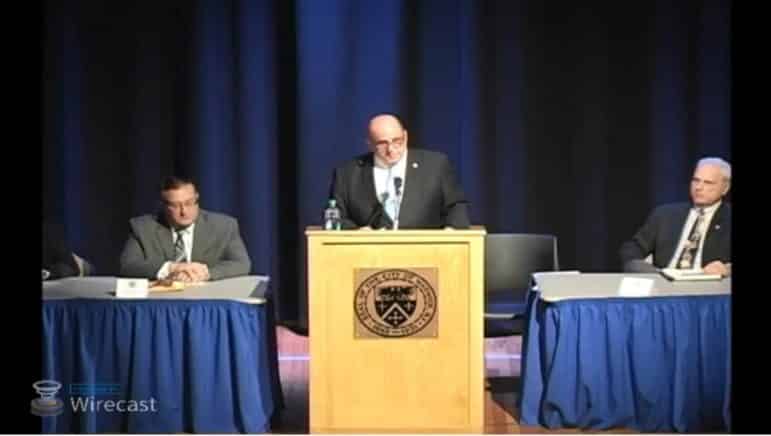

[Screenshot: YouTube]
In that time, Solomon has acted less like the 20-year tenured city councilor he was before taking the city’s highest office and more like a student — and so far, his grades aren’t good.

Most concerning have been Solomon’s repeated attempts to relieve himself and his former council colleagues (some of whom have also been there for nearly two decades) of the obvious responsibility they have for the city’s current financial state, culminating with his State of the City Address on Feb. 27.
A close second, in terms of poor decision-making, has been Solomon’s use of the mayor’s public forum to give a version of events that, to be generous, doesn’t hold up.
These issues suggest that Solomon is more interested in doing what may benefit him and the council politically, instead of what their priority should be: Addressing the city’s financial problems.
Here’s a breakdown of Solomon’s performance in several key areas:
Financial leadership: D-
On the most highly-charged and volatile subject in Warwick — the city’s finances — Solomon has shown that he’s just not ready for the job.
Aside from his questionable accusations of past fiscal mismanagement, Solomon is trying to use one-time bookkeeping tricks and clearly irresponsible methods to balance the city’s books. He’s also shown a propensity to do exactly the kind of thing that he criticizes Avedisian for doing.
Take the city’s surplus, for example. When Avedisian left office, the unreserved fund balance for the city stood at over $23 million.
In his State of the City address, Solomon said that the surplus is much lower (by at least $10 million) and laid the blame for last two years’ budgets squarely on Avedisian.
But it was Solomon and the council who passed the FY18 budget without a tax increase, over Avedisian’s objections; that decision led directly to the current budget, which required raising taxes to the state-mandated maximum and used some $6 million from the remaining surplus to balance the books.
Or consider the city’s unfunded pension liabilities. For years, Solomon and the council raised red flags (and justifiably so) about past budgets that didn’t keep pace with the potential costs of retiree benefits.
But recently, Solomon announced a mediator’s ruling that the school department could use $4 million from the WISE union pension account to plug a hole in the school budget created when the city council did not cover the shortfall with city funds.
It’s not a good reflection on Solomon that, on the one hand, he would criticize Avedisian for underfunding city pensions — and then would look to withdraw already-paid school pension contributions to bring the school budget into balance.
Even worse, Solomon apparently didn’t do his own research on whether the plan was actually allowed under the law — and as it turns out, the school committee presented a letter to the city council that states the proposed withdrawal from the WISE pension fund is illegal and may endanger its tax-exempt status.
That wasn’t the only problem in how Solomon responded to the school budget — after he claimed that the city had actually met the school department’s request for an $8 million increase, Supt. Philip Thornton publicly took Solomon to task, calling his claims misleading because the mayor was counting $500,000 in state aid and $6 million in building improvements — which are funded by bonds and not the city’s operating budget — toward the city’s contribution to the schools.
Not even an emotional appeal by students for city help to stave off threatened cuts to sports could get the city council to reconsider Solomon’s proposal, which the council had previously approved by a 9-0 vote on May 31.
Solomon’s budget proposal also apparently violates a city ordinance passed in 2017, requiring the break-down of separate compensation methods for the department of public works into line items and a projection of those compensation line items for the next fiscal year.
Even more troubling, Solomon apparently learned of this issue during a public budget hearing, weeks after he first put his budget proposal forth and, presumably, months after first meeting with department heads to draft it.
This was an unforced error that he and his staff should have fixed before presenting the budget to the council. It’s also a stunning misstep in light of his own public criticism of Avedisian for not following a 2011 ordinance that required a renegotiation of the firefighters contract.
Beyond these examples, there’s the long delay in releasing the most recent city audit, which by law was due on Dec. 31, 2018 but was granted an extension by the state auditor.
This is a very basic function of municipal financial reporting, and in his first year as mayor, Solomon has missed the mark — by a lot.
Without showing that he can present a responsible (and legal) budget or provide a basic level of transparency on the city’s books, Solomon’s work in this area remains poor.
Accountability: D
Solomon has acknowledged that he and the council have work to do, and has offered an outline of what that work looks like — and that’s the only thing helping him avoid a failing grade here.
Many of Solomon’s public statements about the city’s condition since he took office have begun and ended with suggestions of mismanagement by Avedisian, and in many cases, attempts to ignore his own role on the city council.
To be fair, Avedisian did leave the city council with an incomplete “maintenance” budget, and his resignation triggered the departure of high-ranking administration officials like the former city solicitor and finance director, leaving a leadership vacuum at City Hall.
Still, Solomon would have been naive, at best, to expect that department heads would stay after he began his tenure as acting mayor by immediately hammering Avedisian.
At the time, Solomon acknowledged that Avedisian had invited him to be involved in the budget process earlier, but Solomon decided instead to “let this be Avedisian’s budget,” the Beacon reported.
This idea directly informed Solomon’s decision to use his state of the city address to blame Avedisian for the withdrawal of $4.2 million in reserve funds during the prior year — after the council under Solomon turned down Avedisian’s proposal that would have raised $7.1 million in new revenue, while increasing spending by $6.5 million.
Solomon has also apparently been on a campaign against providing media access to city department heads and, according to Warwick Beacon Publisher John Howell, issued an order not to print legal ads in the local newspaper. (The city later placed its annual budget in a Beacon ad.)
WarwickPost has also run into issues getting information out of the Solomon administration, including several requests for information about the recent property revaluation being denied by City Assessor Neal Dupuis. That information was summarized in a press release issued by Solomon two weeks ago, weeks after it was requested by WarwickPost, delaying its release until, effectively, a time of Solomon’s choosing.
To put it bluntly, Solomon can’t have it both ways — he can not expect the local media to parrot his talking points while denying their requests for basic, public information.
And when Solomon says to trust him in addressing a potential budget deficit of $18 million while asking taxpayers to forget his role in how the city got here, he’s only doing half the work; committing to cleaning up the mess doesn’t get as much credit when one doesn’t admit one’s role in causing it. It also fails to inspire confidence in the yet-to-be-revealed solution.
Public Image: C+
As council president, Solomon was less visible than Avedisian, simply by the nature of the respective offices they held.
With his move to the mayor’s office, Solomon has adapted to the higher profile that comes with it — and on the positive side, he has made regular appearances at ribbon cuttings and started meetings with PTOs and PTAs to back up his stated commitment to the schools.
Unfortunately, Solomon also seems to be stumbling from one self-inflicted problem to the next without a clear view of how to fix them.
One example is his suggestion that Warwick Center for the Arts should either move out of its current space or pay higher rent to the city to offset the potential costs of moving city hall employees to a different location.
After his initial proposal was reported in the local media, two reporters — as they should — went to WCFA in February to speak with its board president Stephany Hessler to get her reaction. According to the Warwick Beacon, Solomon found out about the media inquiries and walked over to the Armory to “clarify his position.”
He also had “his first (discussion with Hessler) since the center learned of the plan in January,” right then and there, in view of the two reporters.
And in the end, Solomon didn’t clarify, as much as repeat, his original suggestion for the WCFA, and the issue remains unresolved as of this writing.
That it took the threat of media scrutiny (and bad press) for Solomon to personally visit WCFA and speak with its board president about a plan that could displace the organization is bad form.
Ultimately, it’s optics like those — not his later explanations for them — that determine Solomon’s image in the city.
Executive management: D
As mayor, Solomon’s main role is overseeing the day-to-day operation of City Hall (something that generally happens independent of the mayor), and so far, he leaves little cause for confidence.
While the circumstances of his ascension to the mayor’s officer were unique given Avedisian’s abrupt departure, Solomon could have immediately worked to reassure the city and establish a sense of stability.
Instead, he cast himself as a victim.
When added to Solomon’s apparent penchant for bringing in outside groups to look at city operations — like RIPEC — and his recent calls for an across-the-board 5-percent reduction in department spending, he has an uphill climb to instill confidence in municipal employees, especially if he keeps blaming Avedisian, who hired a great number of current city workers and their bosses.
And that all happened before he unilaterally and prematurely announced the terms offered by the city for the new firefighters contract — only to have the union reject them.
His election in November gave him executive control of the city with complete Democratic control over the city council, but that doesn’t mean Solomon can get away with such sloppy behavior.
Conclusion: With 20 years’ experience on the city council and a year in the top office, Solomon hasn’t ‘graduated’ to mayor yet.
This is a test
